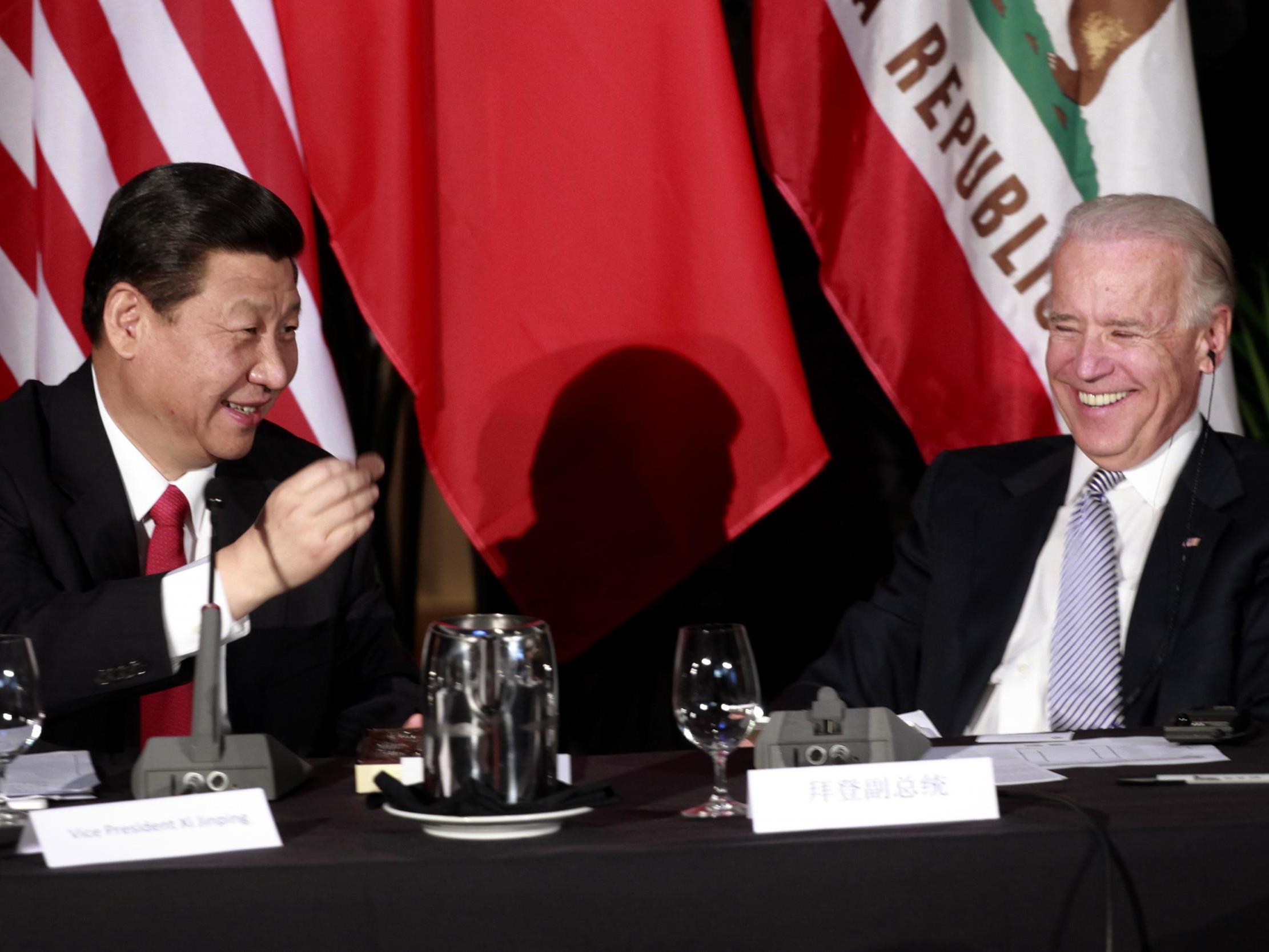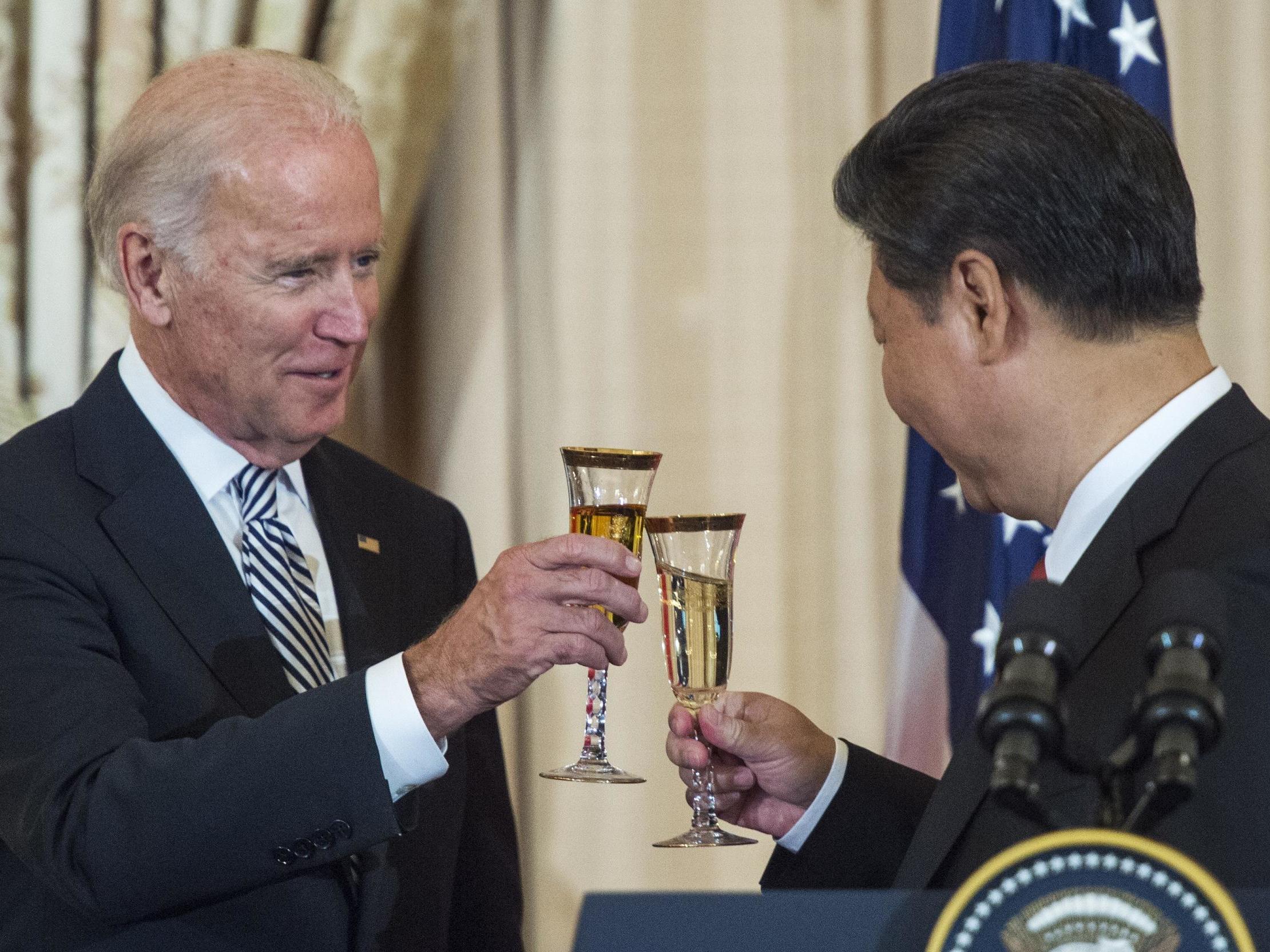Trump using anger towards China over coronavirus to attack Joe Biden as election battle takes shape
The Biden campaign and democrat allies are reportedly preparing to retaliate
Your support helps us to tell the story
From reproductive rights to climate change to Big Tech, The Independent is on the ground when the story is developing. Whether it's investigating the financials of Elon Musk's pro-Trump PAC or producing our latest documentary, 'The A Word', which shines a light on the American women fighting for reproductive rights, we know how important it is to parse out the facts from the messaging.
At such a critical moment in US history, we need reporters on the ground. Your donation allows us to keep sending journalists to speak to both sides of the story.
The Independent is trusted by Americans across the entire political spectrum. And unlike many other quality news outlets, we choose not to lock Americans out of our reporting and analysis with paywalls. We believe quality journalism should be available to everyone, paid for by those who can afford it.
Your support makes all the difference.President Donald Trump and his allies are increasingly seizing on China’s role in the spread of the novel coronavirus as a vehicle to launch a full-throated attack on presumptive Democratic nominee Joe Biden, and to deflect criticism of his own role in the domestic health crisis.
A super Political Action Committee (PAC) supporting Mr Trump on Thursday announced a weeks-long $10m (£8m) ad campaign in Michigan, Wisconsin, and Pennsylvania – three states key to the November election – that attempts to brand Mr Biden as soft on China. The effort, run by America First Action PAC and promoted by Donald Trump Jr, among others, includes a hashtag and a new website tagging the former vice president as #BeijingBiden. The ad follows a Trump campaign ad on the same theme.
The effort to weaponise anger at the coronavirus pandemic and its economic fallout echoes Mr Trump’s past demonisation of Muslims and of Mexico and those with Mexican ancestry. It also attempts to portray Mr Biden and his son as financially beholden to China for decades, accusing them of the same sort of personal profiteering of which Democrats have accused Mr Trump and his family.
Mr Biden’s campaign and other Democratic allies are laying the groundwork for a counter-attack against Mr Trump. On Friday, Mr Biden’s team intends to hit back with a new digital campaign contrasting Mr Trump’s response to the pandemic and China with Mr Biden’s, according to a person with knowledge of the plans, who spoke on the condition of anonymity because the person was not authorised to discuss the matter publicly.
And as Mr Trump’s campaign focuses on Hunter Biden and his business dealings in China, some Democrats suggest they will soon begin targeting Mr Trump’s children and their business activities.
“Despite repeated warnings from our intelligence agencies and medical experts, Trump spent vital weeks praising China’s [coronavirus] response as successful and transparent while deceiving the American people about the extreme threat we faced and failing to prepare our country,” Biden-campaign spokesman Andrew Bates said on Thursday. “China played Donald Trump for a sucker, and now all of us are paying an atrocious price for his malpractice – with over 28,000 American lives taken by this outbreak, infections climbing, and our economy in a nose-dive.”
Dan Eberhart, an oil industry executive and prominent Trump donor, said he sees the issue of China playing a similar role in the 2020 election to that Mexico and immigration played in 2016. He said he believes Mr Biden has “a lot of vulnerability” under that dynamic, but he also suggested the Trump team needed a new antagonist to blame.
“The wall is a fading issue, and its lack of effectiveness in the 2018 midterms relegated it to a simmer on the back burner for the 2020 campaign,” said Mr Eberhart. “The China issue plays to Trump’s strength, and Trump has a long record on being assertive and aggressive toward China.”
He added, “Trump is masterful at figuring out ways to create an enemy and highlighting an enemy and showing his strength by brushing back the enemy. And China is another example of that.”
But Mr Trump has his own political weaknesses, Mr Eberhart said, most notably a “very exposed flank in people saying we weren’t prepared enough” for the pandemic.
Mr Trump’s political career has been marked by targeting a foe and converting weakness into political strength. Early in the crisis, the Trump administration and others labeled the outbreak the “Chinese virus” or, in reference to the city where the outbreak was first identified, the “Wuhan virus.” But he also repeatedly praised China, with which he has been trying to strike a trade deal.
The anti-Chinese approach has been widely copied on the right. Senator Josh Hawley, Republican for Montana, has filed legislation that would set up a US.-led international commission to examine the origins of the virus. He said he would also enable any American affected by the coronavirus to sue the Chinese government.
“We know the truth isn’t that this was just some happenstance occurrence that China didn’t know anything about,” he said on Fox News on Wednesday night. “We know they knew all about this, we know that they suppressed the evidence . . . So let’s get the truth, and let’s hold them accountable.”
Ben Rhodes, who served as deputy national security adviser to President Barack Obama, said the strategy by Mr Trump and his allies to elevate China is a political manoeuvre that is completely in keeping with his style.
“Trump always needs a foreign enemy to animate his support. In 2016, it was radical Islam. In 2018, it was caravans. In 2020, it will be China,” said Mr Rhodes. “The common thread is there’s some foreign enemy and only Trump is willing to stand up to them.”
That pitch belies the true picture of Mr Trump’s own dynamic with China and is unlikely to sway people who are not already staunch Trump supporters, Mr Rhodes argued.
“Substantively, I think he’s tapping into frustration and fears about China that have been present for a long time. But he’s had four years and it’s hard to see what he’s done about that. And one of the biggest challenges he has is there’s a lot of tape of him praising China,” Mr Rhodes said.
Mr Rhodes encouraged Mr Biden, whom he supports, to aggressively rebut the attacks. “I do think it’s essential that they hit back,” he said.

Squabbling over China and the coronavirus is only the latest chapter in the Biden-Trump debate over the Asian economic powerhouse.
Throughout last summer, the two fought over trade policies with China. Mr Trump had seized on a comment Mr Biden made early in his campaign in which he seemed to downplay China as a geopolitical rival, saying that the country was “not competition for us.”
Mr Trump called Mr Biden “a dummy” who wasn’t taking seriously a country that has stolen trade secrets from US companies and manipulated its currency.
Mr Biden, meanwhile, said Mr Trump’s unsettled policy was rattling allies and taking the country toward the brink of a trade war.
“You bet I’m worried about China – if we keep following Trump’s path,” Mr Biden said at the time.

Mr Biden has often talked of how well, as vice president, he got to know Chinese President Xi Jinping. He was a chief point of contact for Mr Xi in the two years before Mr Xi became president in 2013, and worked on a range of policies on which the Obama administration sought Chinese cooperation, including the Paris climate accord and the Iran nuclear deal. Mr Trump has pulled the United States out of both of those international agreements.
As much as on policy, however, Mr Trump’s campaign views China as terrain where it can launch a personal attack on Mr Biden by amplifying criticism of his son Hunter Biden.
Hunter Biden flew to China on Air Force Two with his father in 2013, when the then-vice president was meeting with the country’s leaders. Less than two weeks later, Hunter Biden joined the board of a new investment advisory firm whose partners included Chinese entities.
Affiliates of the advisory firm said they planned to raise $1.5 billion (£120b). Hunter Biden’s attorney has said that it wasn’t until October 2017 that he acquired a financial stake in the firm, BHR, and that his interest was worth $430,000 (£345k) last year.
“Joe Biden has a big China problem,” Tim Murtaugh, the Trump campaign’s communications director, said as he wrapped together the criticisms.
“He doesn’t view China as an economic competitor, he was critical of the President’s lifesaving China travel restrictions, he has resisted holding China accountable for the virus outbreak, and his son Hunter remains on the board of a Chinese investment firm despite promising months ago to resign,” he added. “Joe Biden will be held accountable for failing to stand up against China when workers needed it most.”
George Mesires, an attorney for Hunter Biden, said his client resigned from the investment firm’s board in October 2019, and that a database that lists Hunter Biden as a board member would be updated when a successor is named.
Mr Biden’s campaign has pointed out frequently that Mr Biden warned of the coronavirus outbreak in late January, at a time when Mr Trump had kind words for Chinese leaders and their handling of the virus. Mr Biden has also said that he supported Mr Trump’s restrictions on travel from China but that the president should have acted more urgently.
“China has been working very hard to contain the Coronavirus,” Mr Trump tweeted on 24 January. “The United States greatly appreciates their efforts and transparency. It will all work out well. In particular, on behalf of the American People, I want to thank President Xi!”
“I think China is very, you know, professionally run in the sense that they have everything under control,” Mr Trump said a few weeks later on Fox Business.
The new ads from America First show Mr Biden offering praise in the past for China.
“I believed in 1979 and said so and believe now a rising China is a positive development,” Mr Biden is seen saying in a 2011 address.
One of the pieces of evidence in the ad for Mr Biden’s support for China is a vote to normalise trade relations in 2000. But that legislation was also supported by every member of the current Senate Grand Old Republican Party (GOP) leadership, including Senate Majority Leader Mitch McConnell of Kentucky, Senator John Thune, Republican for South Dakota, Senator Roy Blunt, Republican for Monatana, and Senator Charles Grassley, Republican for Iowa.
An ad last week from Mr Trump’s campaign also portrayed Mr Biden as too reluctant to criticise China. The ad, however, included an image of Gary Locke, a former governor of Washington state, and appeared to suggest he is a Chinese official.
The footage of Mr Biden with Mr Locke – who is Chinese American and was serving as US ambassador to China at the time – is interspersed with Mr Biden with Chinese officials.
The Washington Post

Join our commenting forum
Join thought-provoking conversations, follow other Independent readers and see their replies
Comments